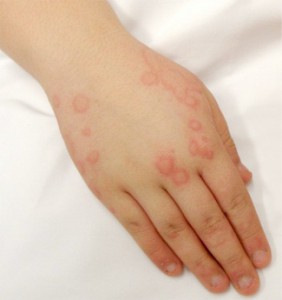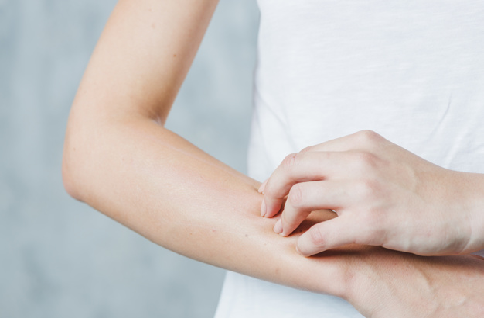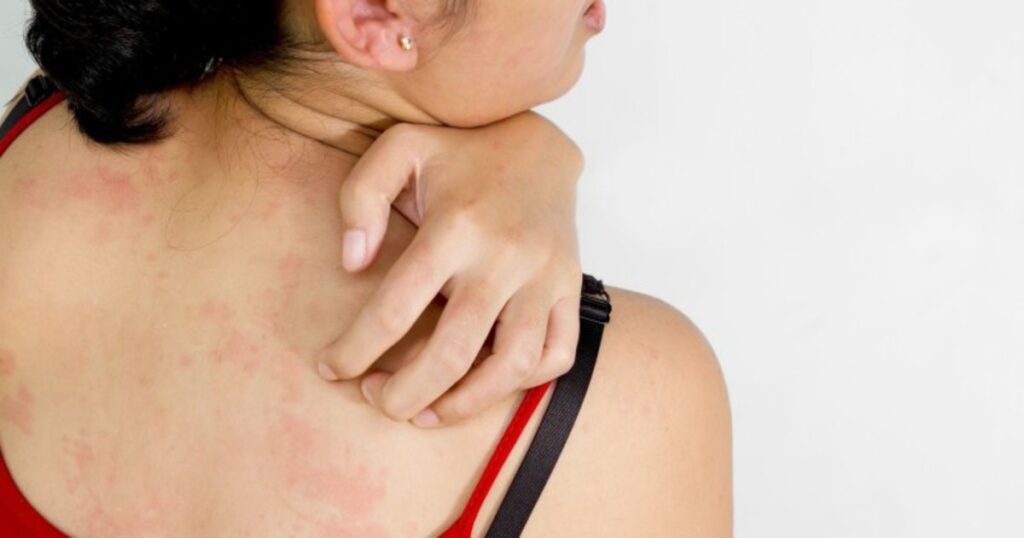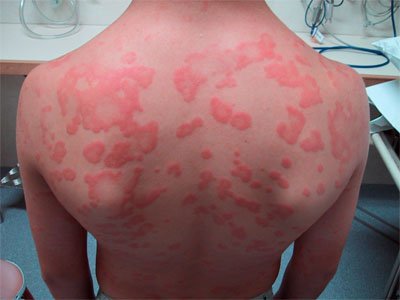 Urticaria is commonly a hypersensitivity reaction of the skin to various factors-external and internal. Common external factors are food items like sea food, colouring agents, eggs, meat, or environmental factors like pollens, bee sting, etc. Aspirin and other painkillers like ibuprofen or high blood pressure medications can also cause urticaria rashes. Excess heat, cold, exercise or sweating may also cause urticaria.
Urticaria is commonly a hypersensitivity reaction of the skin to various factors-external and internal. Common external factors are food items like sea food, colouring agents, eggs, meat, or environmental factors like pollens, bee sting, etc. Aspirin and other painkillers like ibuprofen or high blood pressure medications can also cause urticaria rashes. Excess heat, cold, exercise or sweating may also cause urticaria.
Symptoms
Urticaria begins with ill defined red patches. This is accompanied by severe itching. The patches rapidly develop within minutes to form typical lesions called wheals. Wheals are round or oval closely placed patches which may combine to form bigger patches. Wheals are temporary, lasting individually for 4-8 hours. The condition may persist with appearance of new wheals.
Any part of the body may be affected like trunk, face, lips, limbs.
Angioneurotic edema is a severe complication of urticaria which affects arms, legs, face, eyes and inner lining of mouth and throat. Such a type of swelling is seen more in drug-induced urticaria. This is sudden in onset.
Many times, symptoms like difficulty in breathing, heaviness in chest, wheezing, abdominal pain may be the associated complaints, may require urgent treatment to avoid complications.
Investigations
A detailed history for urticaria treatment is more important than the battery of investigations in finding the probable cause of urticaria. However, in cases of chronic hives where the cause is difficult to locate, skin allergy tests can be done, but have many limitations. Routine blood tests may be advised to rule out other systemic illnesses.
Urticaria Treatment
Acute urticaria should be attended to immediately since it may be accompanied by swelling in the throat and spasm in the lungs. For acute urticaria, antihistaminics are given initially—which provides temporary relief.
When antihistamines don’t provide relief, oral corticosteroids may be prescribed in cases of chronic urticaria.
Some of the main side effects of antihistamines include Dry mouth and Drowsiness
Tips
- Avoid causative triggers, such as particular foods items, alcohol, pain killers, heat, exertion, and stress.
- Apply cool or wet compresses/cloths to the affected areas.
- Avoid exposure to warm temperature rooms.
- Wear loose-fitting clothes.
- Avoid scratching.
- Keep a note of when and where your urticaria occurs, what were you doing, what were you eating, and so on. This may help you and your doctor identify triggers.
The use of Homoeopathic medicines for Urticaria Treatment is very promising. It is quite advanced and scientific as it is not aimed at just relieving the symptoms, but treats the disease at the immunological level. The treatment plan thus designed is addressed towards correcting the immune system and in turn treating Urticaria from within.
Dr Rajesh Shah’s research based Homoeopathic Urticaria treatment has benefitted hundreds of patients all over the world. Get in touch with us today to learn how Homoeopathy can help treat your Urticaria from the root.




